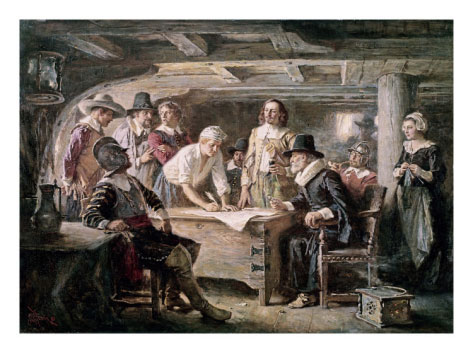36. The Mayflower Compact
Located: 3rd floor, conference room inside Courtroom 2 vestibule
Print in courthouse exhibit: Jean Leon Gerome Ferris, Signing the Mayflower Compact, 1620
The short essay explains the circumstances surrounding the document that established a “single civil body politic” to govern the colony of New Plimoth, signed, prior to landfall, by the 41 adult male passengers aboard the Mayflower in November, 1620.

“Civil Body Politic”
The Mayflower Compact (1620) was the first governing document in the history of New England. It was a simple written agreement signed by the 41 adult male passengers onboard the Mayflower. The compact created a “single civil body politic” with fair and equal laws voted upon by common consensus that would govern the colony of New Plimoth (Plymouth).
Mayflower was originally bound for the Hudson River; land that was part of the Virginia Company of London’s charter. They accidently landed further north in what is now Massachusetts. Those who were not members of the Puritan Separatist Church asserted that since the colony would not be established in the original location, they were no longer obligated to acknowledge the separatists’ authority. Instead, they would “use their liberty; for none had the power to command them.” The compact united the new settlers and maintained the essential essence of community that would prevent such factions from re-forming in the future.
The compact was neither referred to as the “Mayflower Compact” nor granted any real social or political significance until after the American Revolution. In 1802, President John Quincy Adams called the compact “the only instance in human history of that positive, original social compact”—the heart of democracy. It has been a central piece of American political history ever since.
Unfortunately, the original draft of the compact has been lost. However, there are three copies of the text; the two most notable being from William Bradford’s On Plymouth Plantation and the anonymous Mourt’s Relation. Both accounts allow us access to the earliest of American democratic experiences.
The text reads as follows:
In the name of God, Amen. We whose names are under-written, the loyal subjects of our dread Sovereign Lord, King James, by the grace of God, of Great Britain, France, and Ireland King, Defender of the Faith, etc.
Having undertaken, for the glory of God, and advancement of the Christian faith, and honor of our King and Country, a voyage to plant the first colony in the northern parts of Virginia, do by these presents solemnly and mutually, in the presence of God, and one of another, covenant and combine our selves together into a civil body politic, for our better ordering and preservation and furtherance of the ends aforesaid; and by virtue hereof to enact, constitute, and frame such just and equal laws, ordinances, acts, constitutions and offices, from time to time, as shall be thought most meet and convenient for the general good of the Colony, unto which we promise all due submission and obedience. In witness whereof we have hereunder subscribed our names at Cape Cod, the eleventh of November [New Style, November 21], in the year of the reign of our Sovereign Lord, King James, of England, France, and Ireland, the eighteenth, and of Scotland the fifty-fourth. Anno Dom. 1620.

The Mayflower Compact - (J.L.G. Ferris)



